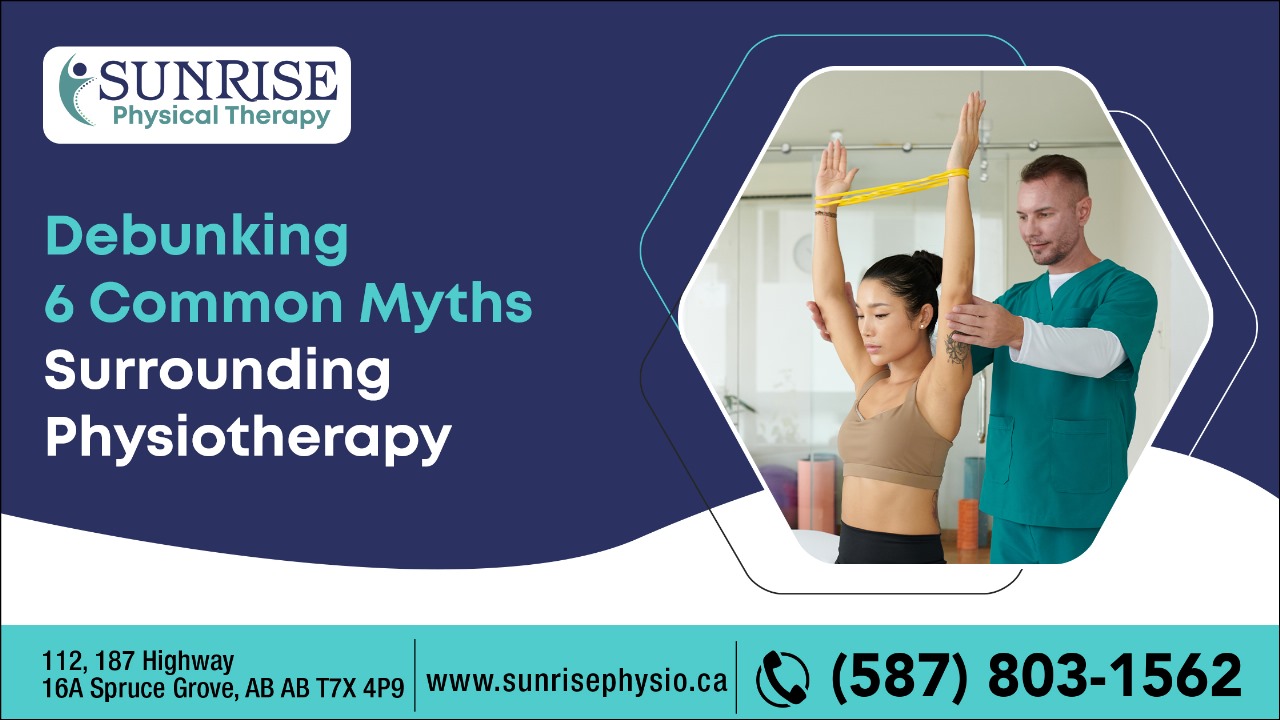
Respiratory conditions, from asthma to chronic obstructive pulmonary disease (COPD), can significantly impact daily life and overall well-being. At Sunrise Physical Therapy, physiotherapy Spruce Grove plays a crucial role in managing these conditions, improving respiratory function, and enhancing the quality of life for those affected. Here’s how physiotherapy can make a difference in the management of respiratory conditions.
Understanding Respiratory Conditions
Respiratory conditions encompass a range of diseases that affect the lungs and breathing. These include:
-
Asthma
-
COPD (Chronic Obstructive Pulmonary Disease)
-
Bronchitis
-
Emphysema
-
Cystic fibrosis
-
Pulmonary fibrosis
Symptoms may include difficulty breathing, wheezing, chronic cough, fatigue, and reduced exercise tolerance. These conditions can be exacerbated by factors such as allergens, environmental pollution, infections, and respiratory muscle weakness.
Physiotherapy at Sunrise Physical Therapy aims to alleviate symptoms, improve lung function, and empower patients to manage their condition effectively.
Physiotherapy Techniques for Respiratory Management
Physiotherapists at Sunrise Physical Therapy use a variety of techniques to help patients manage respiratory conditions:
Chest Physiotherapy (CPT)
Percussion and Vibration Techniques: These manual techniques are used to loosen mucus in the airways, making it easier to cough it up. Percussion involves rhythmically tapping the chest wall with cupped hands, while vibration uses a gentle shaking motion over the chest to encourage mucus clearance.
Postural Drainage: This involves changing the patient’s position to allow gravity to assist with mucus removal from the lungs. When certain areas of the lungs are more dependent, they can better clear mucus when positioned lower.
Breathing Exercises
Diaphragmatic Breathing: Techniques like diaphragmatic breathing help strengthen the diaphragm and improve lung capacity. This method involves slow, deep breaths, focusing on expanding the diaphragm rather than the chest.
Pursed Lip Breathing: This exercise helps control breathing, slows down respiratory rate, and reduces breathlessness. By breathing in through the nose and exhaling slowly through pursed lips, patients can improve airflow and manage shortness of breath.
Incentive Spirometry
Breathing Tools: Patients use devices like incentive spirometers to encourage deep breathing exercises. These devices measure the volume of air inhaled and encourage patients to take deep breaths to strengthen the lungs and prevent lung collapse.
Activity-Based Physiotherapy
Exercise Prescription: Tailored exercise programs are designed to improve overall fitness and respiratory muscle strength. These exercises include walking, cycling, or specific respiratory exercises that focus on endurance and strength.
Pulmonary Rehabilitation: This comprehensive program combines exercise, education, and behavior modification to help patients manage their condition better. It often includes breathing techniques, aerobic and resistance exercises, and nutritional advice to optimize health.
Airway Clearance Techniques
Aerosol Therapy: This involves the use of nebulizers to deliver medication directly to the lungs, helping to open airways and reduce inflammation.
Positive Expiratory Pressure (PEP): A device that provides resistance during exhalation can help to keep airways open and remove mucus by increasing the pressure inside the airways during breathing out.
The Benefits of Physiotherapy in Respiratory Management
Physiotherapy offers numerous benefits for individuals with respiratory conditions:
Improved Lung Function: Physiotherapy techniques can enhance lung capacity, reduce breathlessness, and increase exercise tolerance.
Effective Mucus Clearance: Techniques like chest physiotherapy help to clear mucus from the lungs, reducing the risk of infection and improving overall respiratory health.
Better Management of Symptoms: Through breathing exercises and education, patients can better manage symptoms like shortness of breath, coughing, and fatigue.
Increased Quality of Life: By improving respiratory function, physiotherapy allows patients to engage more fully in daily activities and maintain a higher quality of life despite their condition.
Empowerment through Knowledge: Education on breathing techniques, posture, and activity modification empowers patients to take control of their condition and make informed choices
about their health.
Why Choose Sunrise Physical Therapy for Respiratory Care?
Sunrise Physical Therapy in Spruce Grove is equipped with experienced physiotherapists who specialize in the management of respiratory conditions. The clinic offers:
Personalized Treatment Plans: Each patient receives a customized program based on their specific condition, needs, and lifestyle.
Multidisciplinary Approach: The physiotherapy team collaborates with other healthcare professionals, such as pulmonologists and dietitians, to provide comprehensive care.
State-of-the-Art Equipment: Access to tools and techniques like incentive spirometry, nebulizers, and PEP devices enhances treatment effectiveness.
Education and Support: Patients are provided with ongoing education and support to ensure they understand their condition and how to manage it effectively at home.
Take the First Step Towards Better Respiratory Health
If you or a loved one is struggling with a respiratory condition, consider the benefits of physiotherapy at Sunrise Physical Therapy in Spruce Grove. Contact us today to schedule an assessment and discover how our specialized care can help you breathe easier and live more fully. Together, we’ll work toward achieving better respiratory health and a higher quality of life.
#physiotherapysprucegrove #empoweryourhealth #physiotherapyworks #physiotherapynearme #physiotherapy #physicaltherapysprucegrove #physicaltherapynearme #physicaltherapy #physiotherapistsprucegrove #physicaltherapist #physiotherapyclinic #physioclinicsprucegrove
#sunrisephysicaltherapy